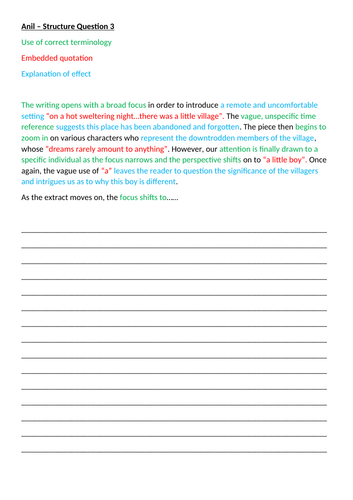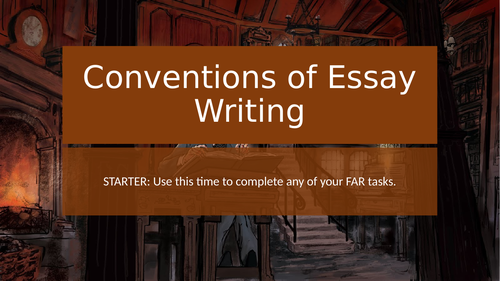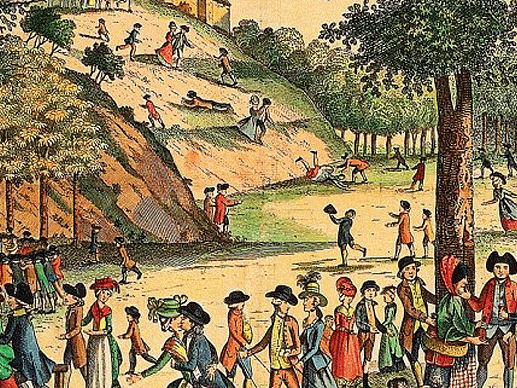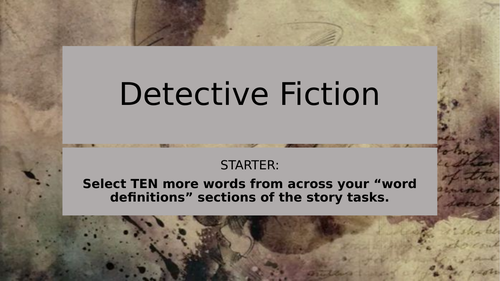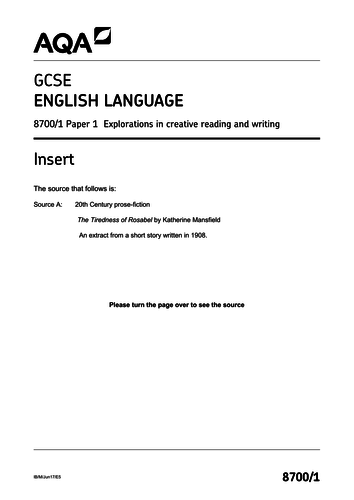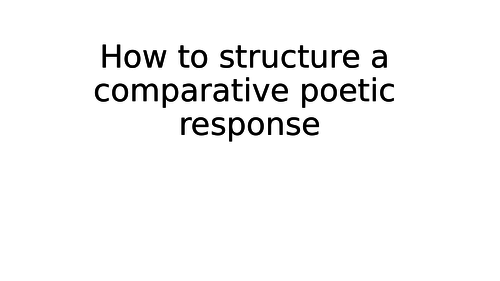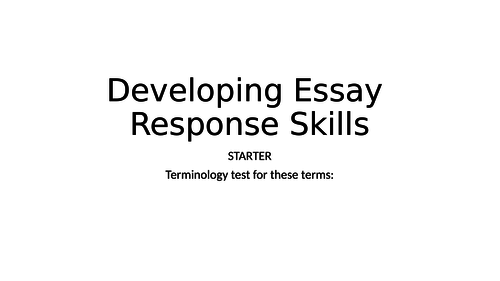
228Uploads
561k+Views
1393k+Downloads
All resources

AQA English Language Paper 2 Deconstruction: The Crossing vs. Idle Days in Patagonia
This resource was designed to be used after a class or cohort have sat the 2019 English Language paper 2. It’s set up to be used after a class has sat the exam and had their papers marked, but it wouldn’t take much modification to be used as part of a scenario where the students get the material, execute a preparatory strategy, answer the question and then peer/self mark.
The material from the AQA mark scheme has been integrated into the PowerPoint, so students can get a sense of what level their response is before fine marking. I’ve done a few in this style and the students value them as revision tools too.

AQA English Language Paper 1: Brighton Rock
A deconstruction of the English Language Paper 1 examination that uses Brighton Rock as a source. I’ve lifted the model material from the mark schemes and there’s FAR related targets included. Essentially, this is a lesson that can be taught either AFTER the students have sat the exam and you want them to peer/self assess, or you could change it so that that they answer a question and then mark their efforts.
The Section B element is a bit of an experiment - peer marking creative writing is always a challenge. So I’ve given the students a series of yes/not/some related questions. The idea is that they “tick” the level next to the answer on a copy of the AO5 and AO6 mark schemes. Using that, they should be better able to work out where the creative writing fits. My peer marked creative writing has got much more accurate as a result of this.

AQA: Year 9 Intro to English Language Paper 1 + Workbook
A variation on a selection of lessons that I sell elsewhere. Here, the center piece is a 26 page printable workbook that runs in tandem with the power-point lessons - ideal for a Summer Term 2 unit of work where you are reluctant to give the students a new work book, and working on paper is problematic.
The text is Anil (from the old Sunlight on the Grass Anthology) and there is about 12 lessons worth of material here.

AQA English Language P2: Section B (using A Christmas Carol)
A series of lessons designed to make sure students have a clear understanding of the “basics” and the “developed” skills and techniques required for EACH of the possible text types they could meet in Section B of the English Language Paper 2 exam. Because my lot were taught A Christmas Carol (and I was trying to kill two birds with one stone by revising this at the same time…), the tasks are all focused on writing within the world of Scrooge. To that end, they may require some editing on the part of the user - hence the reduced price.

AQA English Language P2: Glastonbury vs Greenwich
A simple power-point designed to be used either AFTER a class has sat the AQA English Language Paper 2 Specimen Paper 2, or as part of a walking-mock style lesson where the students mark their work immediately afterwards. It’s cheap because I’ve essentially deposited the contents of the mark criteria on to the power point in such a way that the students can use it it to peer or self-assess. The resource JUST contains the power point.

AQA Power and Conflict BATTLE CARDS
As part of my quest to engage students with the 15 Power and Conflict poems, I’ve come up with these Battle Cards. Essentially, the idea is to promote AO1 and AO2 related discussions that get the students to recall what they know about the poems they have been taught without having the actual poem in front of them.
The students “score” each of the poem against a number of POWER and CONFLICT related areas. This is recorded on an A5 sized BATTLE CARD where they can draw supporting images(good for recall) and identify methods, key quotations and themes.
The idea is for students to battle one another and use the cards as the stimulus point for the discussion. Whoever is best able to justify the score they have given for their card wins the round.
I’ve included a blank card along with 15 poem specific cards (each of these has a supporting back ground image, but is the same as the blank card in all other respects).

AQA English Language Paper 2 Section A Resource pack: Jack the Ripper vs Zodiac Killer
A set of resources designed to engage year 11s with English Language Paper 2 Section A. I shaped the lessons around the articles written surrounding the time of Jack the Ripper, and around an article published following the Zodiac Killer sending a letter to the San Fransisco Chronicle.
The class were fascinated by these articles - I had students independently going away and reading pre-19th century newspapers off their own backs! This will need to be taught delicately though - the content is graphic in nature, so be sure that your class has the necessary level of maturity to access this material without being distracted.

AQA English Literature: Macbeth
A collection of resources designed to support the teaching of Macbeth at GCSE level. The lessons assume that the class will be “acting” out the play, using the summary as a stimulus for the acting out element. I interspersed this acting with numerous directions to read the text aloud; overall, the students enjoyed this combination of normal language and Shakespearean.
It has always been my way to establish an initial understanding of a Shakespearean text before trying to wade through the language.
Hopefully, this will prove a useful starting point.

AQA A Level Drama Spreadsheet Machine
A spreadsheet designed to track the academic progress of up to 30 A-Level drama students (you can do more, but you’d have to UNHIDE every hidden columns in order to make sure that the new cells work).
I have included the 2018 and 2019 grade boundaries (as published by AQA), and left both the room and the capacity for the spreadsheet to be updated with 2020 and 2021 grade boundaries.
The spreadsheet will tell you how many marks each student needs to achieve their target grade for each component of the course. The “Machine” calculates this on a section by section basis for each of the components. Additionally, there is room for up to 10 attempts for each of these components. The spreadsheet will then show you the BEST, AVERAGE and LAST marks each student achieved.
Hopefully, this will make it easier for drama teachers to keep track of where their students are.
NOTE: I’ve designed this with the best intentions, but if there is a “bug” or an improvement that you feel would be beneficial after purchase, then leave a note in the comments section and I will attend to it quick sharpish.

KS3: Detective Fiction - Sherlock Holmes. Workbook included. Reading and Writing SoW.
A thoroughly enjoyable unit of work. Built around a work booklet and designed for that awkward half-term at the end of the year where you don’t want to give out new exercise books.
The workbook contains a copy of The Norwood Builder, comprehension questions and vocabulary list, as well as a variety of activities that focus (primarily) upon creative writing skills with some language and structure based tasks.
The lessons are designed to be used with the workbook.
NOTE: I may upload a slightly different workbook in the future, but I will leave the original on here.

AQA English Language and Literature A-Level: Foregrounding Heaney
A few elements of my class really struggled with this concept. So, I’ve broken it down into a step by step guide. The class will each need a copy of the AQA Poetry Anthology for this. It focuses on Follower first and then sets them up for an academic tilt at a comparative response.
I’ve had a good response from the elements of the class that initially struggled too.

AQA English Language Paper 1: The Tiredness of Rosabel exam deconstruction
A lesson designed to be taught AFTER the class has sat a mock exam. However, with very little modifcation this can become a walking-talking mock exam, or a peer/self assessment based lesson.
The powerpoint contains model material and an indicator as to the quality of the model material. My class found this lesson to be very useful.
Additionally, the insert is available for free should you wish to download it for yourself. I include the link below:
https://linwood.bournemouth.sch.uk/summerwood/files/2017/12/8700_1-INS-EnglishLanguage-G-6Jun17-AM.pdf
Bundle

AQA GCSE Curriculum
Every scheme of work that I’ve made that could be used to teach AQA English Language and AQA English Literature

AQA English Literature - A Christmas Carol: Complete Unit of Work
The lessons are designed to tie in specifically with the Scholastic Classics version of the text OR the Collins Classroom Classics version, but it wouldn’t take too much to use this with any version to be honest.
Visually, the powerpoints are designed to be eye-catching. Each one is loaded with links to videos, layered with animations and suitably spooky xmas music.
The lessons are ordered via number for your convenience. There is a specific focus on each of the GCSE Assessment Focuses, starting with AO3 (It makes sense, to me at least, to contextualise the story prior to reading it).
The stave lessons each contain definitions of the archaic words (though there is a definite backing off with this the further in you get: as the students get more familiar with the language, they’ll need less prompting with decoding it), as well as a particular focus on key quotations. There are comprehension questions layered throughout, and the first THREE of the stave lessons have an ending task that links to a type of question found in AQA English Language Paper 1 Section A - my class had previously focused on this unit and it made sense to me to keep these skills “hot” so to speak.
The AO specific lessons tie in with the Assessment Objectives for the English Literature course. The AO1 and AO2 lessons assume that the students have read the entire text.
Finally, the theme lessons build towards the students sitting a GCSE Literature style assessment.
I have sourced a lot of ideas from the following pdf file - I wouldn’t feel comfortable trying to pass these ideas off as my own; I include the link so that any person might have the benefit of this resource without having to pay for mine:
http://drbacchus.com/files/christmas_carol/glossary.pdf
There’s about 30+ hours worth of teaching materials in here; enjoy!

AQA English Language PAPER 1 Creative Writing Tasks/Resources
Three slides on a power point that can easily be printed out and handed out as a task. Each slide gets progressively more complex. Each slide contains a choice of two tasks (one descriptive and one relating to the writing of a narrative), a punctuation related challenge, a content challenge and an organisational challenge.
Ran it with my year 11s yesterday and they found it very useful.
Oh yes! I have intentionally put one spelling/punctuation mistake on each slide with the idea that I award a housepoint to the first student that identified it. You’re welcome!

AQA English Language and Literature: Developing Essay Writing Skills for the Heaney section
I used a similar approach with the Paris Anthology section and my class found it to be very useful. The issue they were having focused on incorporating enough AO1 terminology appropriately. This lesson is designed to talk them through an approach to an essay question, starting with the poetic voice, moving on to selecting relevant areas and then placing each level of language as a different starting point before exploring ideas across the language levels. It seemed to work…
Hope others find this useful as a starting point.

AQA English Language and Literature: Developing essay response skills to the Paris Anthology section
This is my attempt to engage and develop my Year 12s academic voices in their Paris Anthology related essay responses. The main issue my class had seemed to focus upon when and where to start. What I do is show them how they can place a particular emphasis on one of several potential areas of focus initially. I show them how they could use Mode, Audience, Purpose, each of Grice’s Maxims and each of the different levels of language as a starting point for an analytical response. The attached word document appears to be an “essay”.It isn’t. It’s the collected starting points placed in one document so that the students can focus more on the “how you do it” instead of trying to copy down the best bits.
It worked reasonably well and is suited for a class with similar needs. Hope you find this useful.

Punctuation vs Teachers: Tracking punctuation skill progress and making it fun(ish...)
A series of activities that are designed to be taught over time. There is a bit of initial leg-work to do in setting up the spreadsheet and, truth be told, I’ve had more success using this with smaller classes than with larger ones - the volume of specific data generated gets unwieldy with the larger groups.
So, I’ve divided punctuation up into three groups - BASIC, MID-RANGE and ADVANCED. The idea is that you teach/go over/re-demonstrate the type a type of punctuation. Then, the students are given ten minutes to write where they focus on using that type of punctuation. Each punctuation type has a points value, and the goal is to “defeat” a possessed teacher by using that type of punctuation. The powerpoint presentations each show a teacher (or a combination of teachers) making their way across the screen over the course of ten minutes. There’s the option of spooky orchestral music too.
There are specific work sheets that each student will need - each work sheet contains the points value of each punctuation type and a grid where you can wither self/peer/teacher assess depending on how you want to set the lesson up.
As the class progresses, so to does the complexity of the task. Each new level incorporates a new type of punctuation OR (more importantly) a new combination of focuses. For example, level 3 requires students to use BASIC and MID-RANGE punctuation to defeat two teachers.
What I found useful was the specific nature of the feedback I got: I could see quite clearly which punctuation types were defeating each student and which punctuation type was an issue for the class as a whole. And, if the class lost (which they did on more than one occasion) then they retried the level the following week.
We used this in SPAG lessons in combination with some other elements - it can easily be made into a whole lesson.
A useful little tool…

AQA English Literature Power and Conflict Poetry: Random Comparative Question Generator
Does exactly what it says. This spreadsheet will create one random comparative question for and will generate a new one every time you double-click a cell and press enter. A word of caution in that you cannot retrieve the old question. But, this is very useful for revision and or cover lessons.
I’ve left room for you to add in your own question stems and you can manipulate the poetry lists too. I’ve left some instructions on the relevant tab.
Hope you find this useful.



